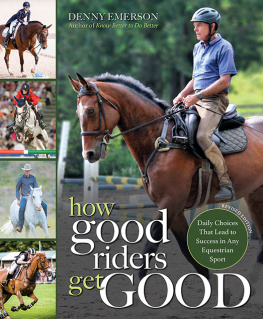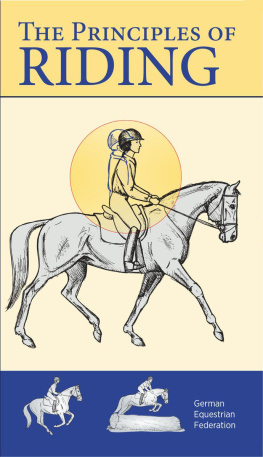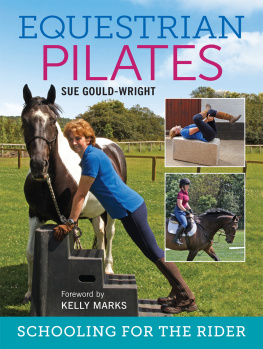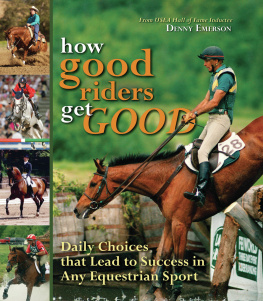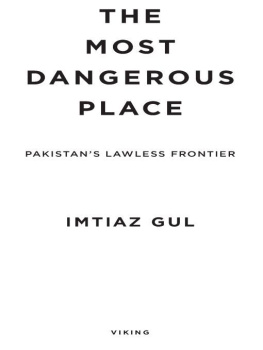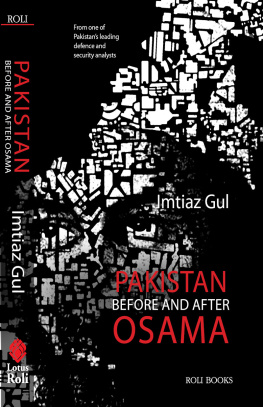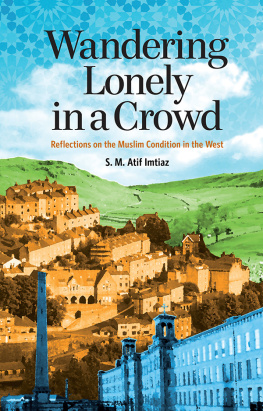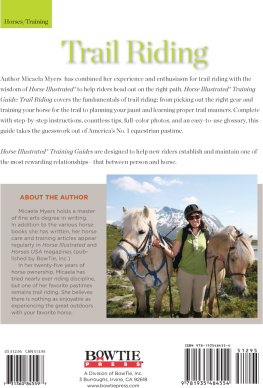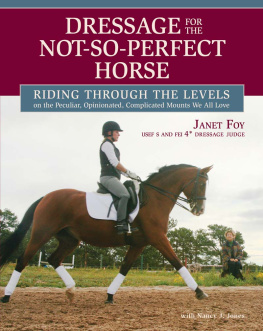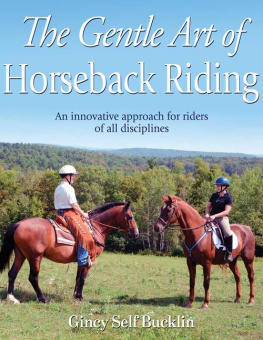Table of Contents
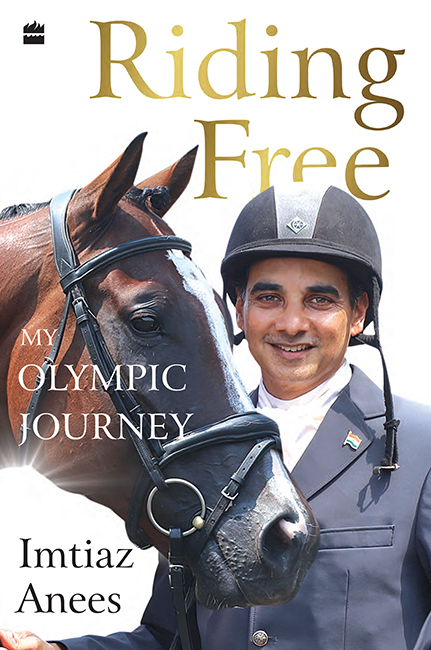

To
Mum & Dad, for always standing by my crazy absurd ideas.
Diana Wilson, my trainer, my life coach,
my mentor, my undefinable.
Bev McArthur, my home away from home.
You just loved me like Mum.
Khushroo Dhunjibhoy, for having faith in me and
helping me achieve my dream every step of the way.
Contents

M Y heart was pounding as the starter began the countdown:
10987
This was the most exciting moment of my lifethe realization of my boyhood dream and the culmination of many hours of hard work, figuring out how to tackle whatever obstacles the course threw at me.
I was where thousands of eventing riders around the world dreamt of being. At the greatest sporting event in the worldthe 2000 Sydney Olympicsand ready to start the cross-country event.
6543 the countdown continued, and then it was 21 and off we went! Spring Invader, my horse, leapt forward on cue and we were thundering down the course, while I had thoughts for nothing but the first jump coming up and getting the take-off and landing right.

Wear your uniform. Youre getting late for school. Do your homework. Eat your vegetables.
When you are five years old, your life isnt your own. You have to follow the rules set by your parents, you have to listen to your teachers and you have almost no freedom to do what you really want to do. At least thats how it was in the 1970s when I was growing up.
Luckily for me, I discovered the world of horses when I was very young, and once I started riding at the age of four, being on horseback was the only place where I felt really free and alive. I started believing what I saw much later inscribed at the entrance of the regimental quarters of the 61st Cavalry Regiment in New Delhi: If paradise exists, its on horseback that it lies.
As soon as I sat on a horse, I felt I could escape everything and everyone, especially those bothersome voices telling me what I must do. The horse was my very own special friendsomeone I trusted with all my secrets and dreams. He was the one who listened to me, the co-conspirator in my plans to escape into the magic forest and live a fantasy life where there was just me and wild horses, oranother of my grand dreamswinning major titles and medals for my country at sporting events.
These may sound like odd yearnings coming from a city-bred youngster brought up in the bustling and traffic-laden city of Mumbai, where even the horse-drawn carriage, the ghoda-gadi, that had been kept as a tourist attraction outside five-star hotels for many years, had long disappeared.
It was at the Amateur Riders Club (ARC) where my love affair with horses and riding began. My maternal grandfather, Mohamed Kajiji, whom I called Nana Papa, was its president. He was also the president of the Rotary Club and held some position or the other in several clubs and sat on several committees. The elite sporting clubs that dot the major Indian cities are a legacy of the British who ruled India for 200 years. The Indian elite happily adopted the club tradition after the country won independence from British rule. The ARC was one such club. It was where Mumbais affluent kids learnt how to ride. It also allowed members to keep their own horses in its stables for their use.
Nana Papa stabled his horse at the club, which was situated in a corner of the Mahalaxmi Racecourse, home to the Royal Western India Turf Club that organized regular horse-racing activities. ARC members could use the racecourse for training and riding.
A man of many interests, such as horse riding, ballroom dancing and photography, Nana Papa excelled in everything he did and loved the finer things in life. He won many prizes in ballroom dancing, quite the fashion at the time in Mumbais elite social circles but disapproved by my grandmother, Nanima, as his partners were always younger women. Yet, she would go to all the practice sessions as much to keep an eye on Nana Papa as to enjoy the graceful movements of the dance.
Nana Papa was a meticulous man with an eye for detail. He used the best equipment for all his hobbies, and so he had the best horse tooor so I thought. Thanks to him, I was familiar with horses from an early age. From the time I was three, I was taken to the club every evening to pet the horses, and if I was lucky, I was hoisted upon one and taken around the ring by my grandfather or my Mum, Rashida Anees, who was also a good rider.
In 1974, when I was four, I was deemed old enough to take riding lessons at the club on the clubs ponies and was occasionally allowed to accompany my grandfather and Mum on my pony on a round of the racecourse.
My maternal grandparents were relaxed, casual, sociable people who entertained lavishly. They taught me the importance of interacting with people and that one must deal with them in different ways depending on the circumstances. This helped me throughout my career, for I have learnt my people skills from them.
I was fortunate to belong to a close-knit family that doted on me. My father came from a family of nawabs from the princely state of Mangrol in Junagadh district, in what is now the state of Gujarat. My great-grandfather was Nawab Jehangir Mian Saheb and my grandfather, Nawabzada Sadiq, was his youngest son. He was an excellent cricketer and studied law at Cambridge, where he developed a passion for cricket and played county cricket for Sussex. Riding horses was a princely sport in India in those days, in the sense that the many princelings, princes, nawabs and rajas who once abounded in the country-owned racehorses or polo ponies. Everyone in my fathers family rode, including my grandmother Shahzadi Begum. She was from the royal family of Surat, a much larger state than Mangrol. She had been taught to ride as a young girl, as was tradition in aristocratic families of the time.
She once told me a lovely story about an argument she and my grandfather had while out hunting one day. The best way to settle their squabble, they decided, was a shooting challenge. Grandmother, Amma Huzur, challenged grandfather, Dada Huzur, to shoot a flying eagle. He was an excellent shot and brought down the eagle with ease. He, in turn, challenged my grandmother to shoot a panther, with the stipulation that it must be running at the time and she must shoot it in the heart! Amma Huzur took up the challenge and in one shot killed the panther as directed. As the panther lay on the ground there was perfect silence for a moment, Amma Huzur told me. Being a gracious lady raised to allow men the upper hand, she never brought up the subject again, but there was a gleeful look in her eyes when ever she narrated this story.
I was really lucky to be born into a family where my grandparents enjoyed the finer things in life and I was able to appreciate them too. But what was more important was that they were detail-oriented perfectionists. Whatever they did, they gave it their best and with the best training and equipment. This was a major influencing factor in my life as a childI saw them always striving for the best and paying attention to the little things. For example, Nana Papa always ensured that his riding boots were well polished and spotless. Even the horses were always groomed to perfection. Everything had a place and everything had to be just right; never over-the-top, but never less than ideal either. I didnt realize all this at the timeyou never do when you are youngbut the environment around you shapes you and when you grow older, it is what you believe in as well.


